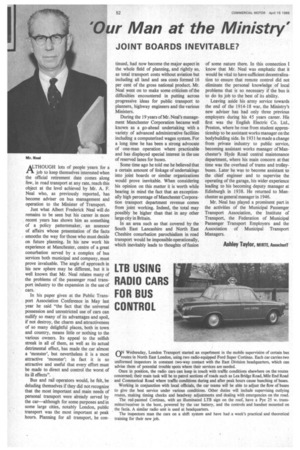'Our Man at the Ministry'
Page 54

If you've noticed an error in this article please click here to report it so we can fix it.
JOINT BOARDS INEVITABLE?
ATHOUGH lots of people yearn for a job to keep themselves interested when the official retirement date comes along few, in road transport at any rate, reach this object at the level achieved by Mr. A. F. Neal who, as previously reported, has become adviser on bus management and operation to the Minister of Transport.
Just what Albert Frederick Neal will do remains to be seen but his career in more recent years has shown him as something of a policy patternmaker, an assessor of affairs whose presentation of the facts smooths the way for those who must decide on future planning. In his new work his experience at Manchester, centre of a great conurbation served by a complex of bus services both municipal and company, must prove invaluable. The angle of approach in his new sphere may be different, but it is well known that Mr. Neal relates many of the problems of the passenger road transport industry to the expansion in the use of cars.
In his paper given at the Public Transport Association Conference in May last year he said "the fact that the universal possession and unrestricted use of cars can nullify so many of its advantages and spoil, if not destroy, the charm and attractiveness of so many delightful places, both in town and country, means little or nothing to the various owners. Its appeal to the selfish streak in all of them, as well as its actual detrimental effect, has made the car almost a 'monster', but nevertheless it is a most attractive 'monster; in fact it is so attractive and useful that every effort must be made to direct and control the worst of its ill effects".
Bus and rail operators would, he felt, be deluding themselves if they did not recognize that the most important and main needs of personal transport were already served by the car—although for some purposes and in some large cities, notably London, public transport was the most important at peak hours. Planning for all transport, he con
tinued, had now become the major aspect in the whole field of planning, and rightly so, as total transport costs without aviation but including all land and sea costs formed 16 per cent of the gross national product. Mr. Neal went on to make some criticism of the difficulties encountered in putting across progressive ideas for public transport to planners, highway engineers and the various Ministers.
During the 19 years of Mr. Neal's management Manchester Corporation became well known as a go-ahead undertaking with a variety of advanced administrative facilities including a computerized wages system. For a long time he has been a strong advocate of one-man operation where practicable and has displayed special interest in the use of reserved lanes for buses.
Some time ago he told me he believed that a certain amount of linkage of undertakings into joint boards or similar organizations would prove inevitable. When considering his opinion on this matter it is worth while bearing in mind the fact that an exceptionally high percentage of Manchester Corporation transport department revenue comes from joint working. Indeed, the total may possibly be higher than that in any other large city in Britain.
In an area such as that covered by the South East Lancashire and North East Cheshire conurbation parochialism in road transport would be impossible operationally, which inevitably leads to thoughts of fusion of some nature there. In this connection I know that Mr. Neal was emphatic that it would be vital to have sufficient decentralization to ensure that remote control did not eliminate the personal knowledge of local problems that is so necessary if the bus is to do its job to the best of its ability.
Leaving aside his army service towards the end of the 1914-18 war, the Ministry's new adviser has had only three previous employers during his 45 years career. His first was the English Electric Co. Ltd., Preston, where he rose from student apprenticeship to be assistant works manager on the bodybuilding side. In 1931 he made a change from private industry to public service, becoming assistant works manager of Manchester's Hyde Road central maintenance department, where his main concern at that time was the overhaul of trams and trolleybuses. Later he was to become assistant to the chief engineer and to supervise the operating of the garage, his wider experience leading to his becoming deputy manager at Edinburgh in 1938. He returned to Manchester as general manager in 1946.
Mr. Neal has played a prominent part in the activities of the Municipal Passenger Transport Association, the Institute of Transport, the Federation of Municipal Passenger Transport Employers and the Association of Municipal Transport Managers.








































































































































